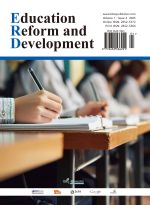Abstract
With the rapid advancement of Internet of Things (IoT) technologies, there is an urgent need for universities to explore more effective teaching models in IoT engineering programs, particularly to address shortcomings in hands-on training and the disconnect between theoretical instruction and industry demands. Very-Large-Scale Integration (VLSI) technology, as one of the core components of IoT, plays a critical role in determining the performance and market competitiveness of IoT devices. The integration of VLSI design automation tools not only improves design efficiency but also provides intuitive and effective means for practical teaching. This study centers on CMOS semiconductor devices and constructs a radial knowledge framework encompassing “Device–Model–Circuit–System.” By employing LTSPICE, a professional-grade simulation tool, the instructional content is visualized, enabling students to develop a deeper understanding of complex circuit principles and device characteristics. In addition, real industrial-grade SPICE models and fabrication process parameters—such as the 45 nm silicon-on-insulator (SOI) technology—are introduced to strengthen the link between academic instruction and practical engineering applications. Moreover, this research incorporates emerging technologies such as artificial intelligence, deep learning, and autonomous driving into instructional case studies, effectively enhancing student engagement, interest, and innovation capacity in practice-based learning environments.
References
Duan Y, Nie W, Meng Z, et al., 2024, Research on Teaching Problems and Countermeasures for IoT Engineering Courses in Colleges Under the Context of Emerging Engineering Education. University, 2024(35): 175–178.
Yang F, Xu N, Yang R, et al., 2024, Exploration and Research on Practical Course Teaching Modes for IoT Engineering Majors in Applied Universities. Internet of Things Technologies, 14(7): 159–162.
Li P, Liu H, Zhang L, et al., 2023, Construction of an Innovation and Entrepreneurship-Oriented Teaching System for Introductory Courses on IoT Science and Technology. The Theory and Practice of Innovation and Entrepreneurship, 6(19): 37–39.
Wang X, Huang B, Huang Q, 2023, Research on Teaching Reform of “IoT Innovative Comprehensive Practice” Course. Hua Zhang, 2023(2): 48–50.
Li C, 2022, Application of Blended Teaching Approaches in IoT Courses. Science & Technology Information, 20(24): 186–189.
Liu Z, Gao Z, Liu S, et al., 2025, Exploration and Practice of Semiconductor Device Physics Curriculum Reform Driven by the Demands of Material Majors. Journal of Higher Education, 11(7): 60–63.
Chang X, 2025, Application of LTspice Simulation Software in Physics Teaching—A Case Study on Overcoming Teaching Difficulties of “Capacitance of Capacitors”. Physics Bulletin, 2025(1): 120–123.
Cao S, 2025, Exploration and Practice of Ideological and Political Education in IoT Courses: A Case Study of the “Sensor Network Application Development” Course. Journal of Hebei Vocational University of Technology and Engineering, 42(1): 30–34.
Feng P, Tang R, Chen X, et al., 2025, Discussion on Integration Model of Basic Engineering Teaching and Artificial Intelligence in Colleges and Universities. The Science Education Article Collects, 2025(6): 86–90.
Wang Y, 2025, Teaching Practice of the Fundamentals of Internet of Things (IoT) Technology in High School Information Technology Courses. Anhui Science and Technology Newspaper, 2025-03-07(014).
Wang W, Fan X, Hao D, et al., 2025, Exploration and Practice of Teaching Reform for the Course “Introduction to IoT Engineering”. Internet of Things Technologies, visited on March 28, 2025, http://kns.cnki.net/kcms/detail/61.1483.TP.20250124.1727.002.html.
